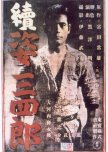Questa recensione può contenere spoiler
Not as entertaining as the original
Sanshiro Sugata Part II was a pale reflection of the original Sanshiro Sugata from 1943. While the original was fun and had a solid story arch, the sequel's story was thinner, more confusing, heavy on propaganda and not very entertaining.
Sugata has been away for two years but hasn't learned much. He helps a young rickshaw driver when a drunk American sailor beats the boy. A Japanese fight promoter hears about the incident and invites him to compete against "Lister the Killer," an American boxer, but he declines. Unfamiliar with boxing, Sugata decides to watch a match and is disgusted by the showy sport, alluding to it looking like dogs or roosters fighting. He returns to the dojo where Higaki Gennosuke's brothers show up looking for a battle with him. Sensei Yano sends the rude brothers away. "The man who knows not himself knows nothing." Later, Higaki Gennosuke whom Sugata defeated in the previous film, who is quite ill but healed in spirit pleads with Sugata to stay away from the unbalanced brothers. Sugata has been suffering from self-doubt wondering whether he should give up judo because of the harm that comes to his opponents but he also wants to fight whenever he can which leads to him not sleeping. He's also concerned about the survival of Japanese martial arts. The three laws of the dojo state that no one is to drink in the dojo, no fighting for money, and no fights without the sensei's permission. Suffice to say he breaks all three, fighting both the American and the crazy karate brother.
This sequel's fights weren't as well done or exciting. The final battle on the snowy mountain was hard to see as the bodies were dark silhouettes on the white background. In the first film, the contests furthered Sugata's growth, in this film, they all seem to be about promoting Japanese martial arts as superior to other forms.
Where Sugata traveled a spiritual path of self-discovery in the first film, he seemed completely confused and erratic in this one. The propaganda was heavy-handed, though it was understandable in the waning days of WWII when the writing was on the wall. While I could easily recommend the first film, this second one may be more for Kurosawa completionists.
8/11/23
Sugata has been away for two years but hasn't learned much. He helps a young rickshaw driver when a drunk American sailor beats the boy. A Japanese fight promoter hears about the incident and invites him to compete against "Lister the Killer," an American boxer, but he declines. Unfamiliar with boxing, Sugata decides to watch a match and is disgusted by the showy sport, alluding to it looking like dogs or roosters fighting. He returns to the dojo where Higaki Gennosuke's brothers show up looking for a battle with him. Sensei Yano sends the rude brothers away. "The man who knows not himself knows nothing." Later, Higaki Gennosuke whom Sugata defeated in the previous film, who is quite ill but healed in spirit pleads with Sugata to stay away from the unbalanced brothers. Sugata has been suffering from self-doubt wondering whether he should give up judo because of the harm that comes to his opponents but he also wants to fight whenever he can which leads to him not sleeping. He's also concerned about the survival of Japanese martial arts. The three laws of the dojo state that no one is to drink in the dojo, no fighting for money, and no fights without the sensei's permission. Suffice to say he breaks all three, fighting both the American and the crazy karate brother.
This sequel's fights weren't as well done or exciting. The final battle on the snowy mountain was hard to see as the bodies were dark silhouettes on the white background. In the first film, the contests furthered Sugata's growth, in this film, they all seem to be about promoting Japanese martial arts as superior to other forms.
Where Sugata traveled a spiritual path of self-discovery in the first film, he seemed completely confused and erratic in this one. The propaganda was heavy-handed, though it was understandable in the waning days of WWII when the writing was on the wall. While I could easily recommend the first film, this second one may be more for Kurosawa completionists.
8/11/23
Questa recensione ti è stata utile?

 54
54 191
191 11
11























